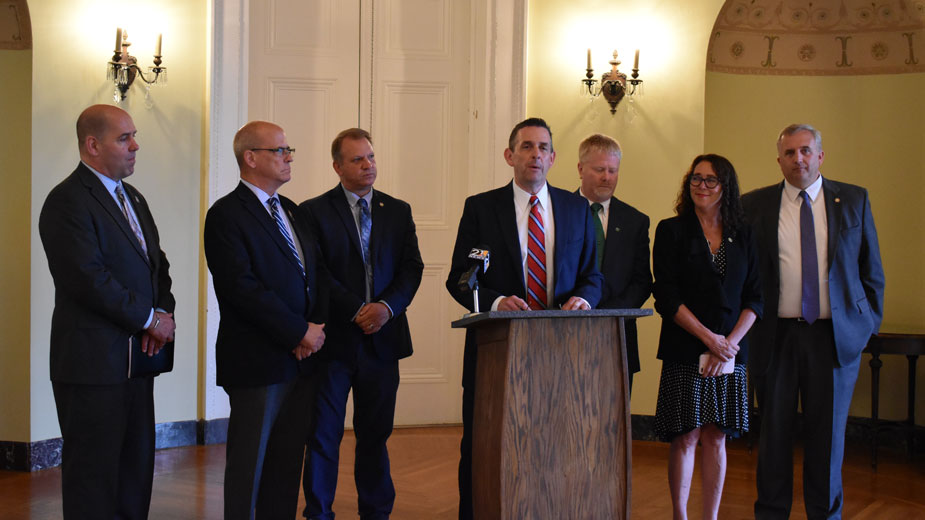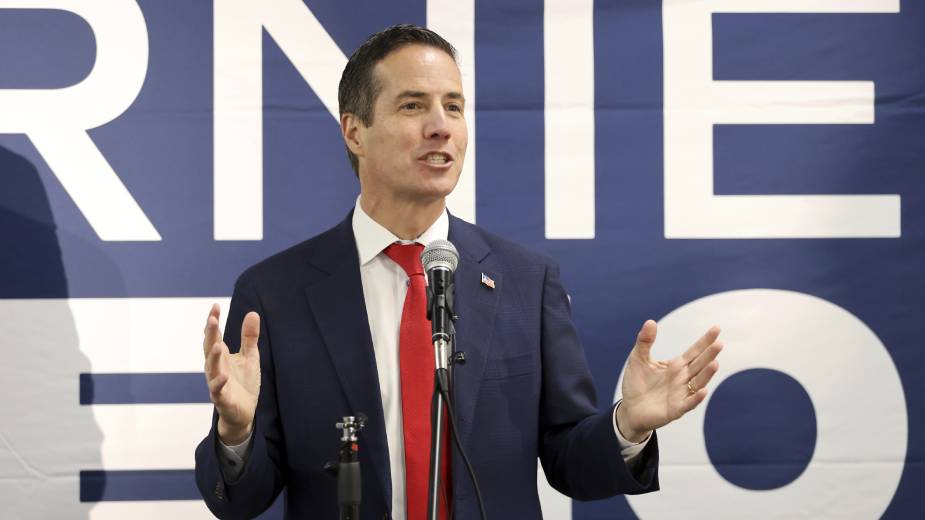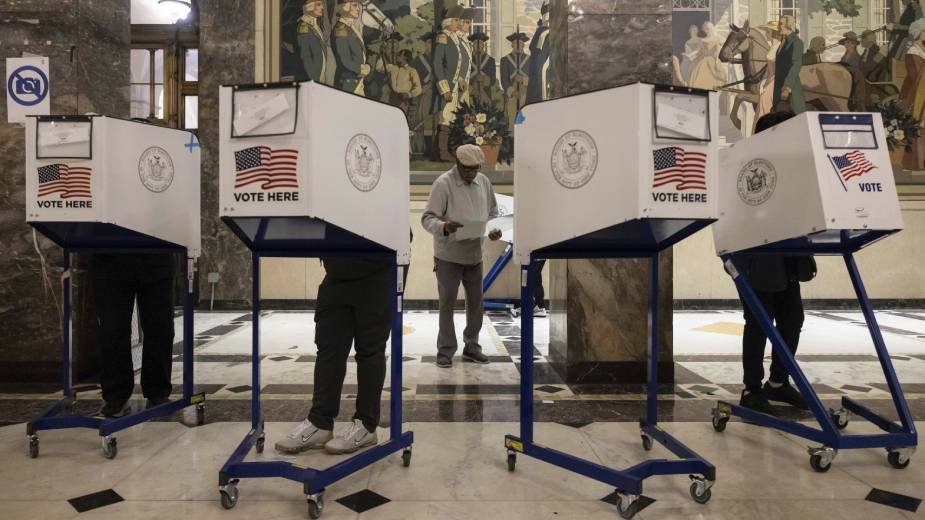Legislators Hail Local Earmarks in State Budget
YOUNGSTOWN, Ohio – State legislators touted their success Friday in securing $4.6 million for local initiatives – and the bipartisan effort they credited for that success – in the newly approved state budget.
The two-year operating budget Gov. Mike DeWine signed into law Thursday provides $2 million for dam removal and other work related to the Mahoning River; $1 million each for America Makes and the Mahoning Valley Innovation and Commercialization Center and $600,000 for the Eastern Ohio Military Affairs Commission’s efforts to support local military assets.
The appropriations represented “tangible proof” that the assembled legislators are working hard for local constituents, said state Sen. Michael Rulli, R-33 Salem.
Rulli was among the six state legislators who joined James Dignan, president and CEO of the Youngstown/Warren Regional Chamber, at the Stambaugh Auditorium for a news conference to discuss the state budget and the local projects that received funding.
Addressing the Mahoning River was one of the early priorities identified in discussions with Dignan and representatives of other local agencies, Rulli said. The budget includes $1.5 million to remove low-head dams in the river and another $500,000 for a feasibility study and implementation plan for the Mahoning River Water Trail initiative.
Once the dams and the heavy sediment are removed, the river largely heals itself, Rulli said.
“It’s all part of the greater thought process of how we strategically make our community a better place,” Dignan said. The river is why people and industry came to this area originally, but for the past five decades the community has turned it back on the river.
“As the community looks forward to grow again, we’re going to turn back toward the river,” he said.
The $1.5 million would be used to leverage other monies to assist with the removal of up to three dams in the river near Warren, said James Kinnick, executive director of Eastgate Regional Council of Governments.
Work on removing a dam in Lowellville has started and funding is in place to remove a dam in Struthers, he continued. Eastgate has secured $3 million for removal of three dams in Youngstown, about half of what is needed, and the agency is seeking another $3 million from the Ohio Environmental Protection Agency.
“We hope to have a decision to move those dams into construction next summer,” Kinnick said.
The assembled legislators also defended the $600,000 for the military affairs commission, which was formed to support assets including Youngstown Air Reserve Station and Camp James A. Garfield in Ravenna, which had been under consideration for a proposed missile defense site.
YARS supports “significant economic development,” said state Sen. Sean O’Brien, D-32 Bazetta. The states of New York and Michigan, other candidates for the missile defense base, spent millions of dollars on their efforts and the $600,000 is “a drop in the bucket” compared to what other states are spending to support military assets, he said.
“Taxpayer money is well spent in this area by supporting these bases,” he said.
The state of Ohio is “behind” in terms of its support of its military assets, added Dignan, who previously served as base commander at YARS. When he first came to the base, it had a direct economic impact of $236 million. That shrunk to $97 million at the time he left, a condition he attributed in part to the “lack of engagement in Columbus and D.C.”
The air base is now the largest employer in Trumbull County following the closing of the General Motors Lordstown Complex. The chamber leader praised DeWine for establishing an adviser for aerospace and military assets when he took office this year.
“We have to be in Columbus. We have to be in D.C.,” Dignan said.
“We have to be proactive. The days of us reacting to problems, they’re over,” Rulli added. Everyone is committed to “what is next, what is the future,” and every dollar secured from Columbus “will be surgically implanted for that,” he continued.
Rulli credited collaboration among the Mahoning Valley’s state delegation – Democrats and Republicans alike – for their success in securing funds for local projects. While on the campaign trail last year, Rulli said he often heard that the state capitol ignored Mahoning and Trumbull counties.
“We have a lot of bipartisan love here for this corridor,” he said. “What you have here is you have a better machine that was built during this process.”
Among the people Rulli turned to as he pursued the local initiatives was O’Brien, who echoed his sentiments and called the budget “a much better bill than we have seen in the last several years.”
The effort involved collaboration among the Regional Chamber, both chambers of the Ohio General Assembly and regional stakeholders including Youngstown State University and Eastern Gateway Community College “coming together to make this a better budget not just for Ohio but specifically for our community,” O’Brien said.
“This is an example of how good government should work,” he said.
State Rep. Mike O’Brien, D-64 Warren, said he and Sean O’Brien, who both serve on their respective chambers’ finance committees, presented local priorities to the legislative leadership.
“We’ve made an impact and we’ll continue to make an impact” because of the bipartisan effort of the local delegation, he said.
The Mahoning Valley has many tremendous resources “a lot of new things on the horizon,” said state Rep. Gil Blair, D-63 Weathersfield. “All the things we’ve done in this budget will ultimately make the Valley a destination for businesses and young families looking for a home.”
In addition to the funding for specific projects, state Rep. Don Manning, R-57 New Middletown, said he is pleased that legislators were able to deliver an across-the-board tax cut “for every hard-working Ohioan.”
State Rep. Michele Lepore-Hagan, D-58 Youngstown, joined her colleagues in the bipartisan effort, “although not everything worked out as we would like it,” she acknowledged. “That’s the reality of the budget process.”
Among the concerns that wasn’t addressed in the state budget was a proposal to eliminate academic distress commissions such as the one governing the Youngstown City School District.
“The best we could do at this time is a moratorium” on new ones, O’Brien said. Lawmakers did get a commitment from the senate president that House Bill 154 – legislation passed by the Ohio House of Representatives that repealed the legislation that created the so-called Youngstown Plan – would move. Provisions of H.B. 154 were contained in the budget but were stripped out by the conference committee.
The legislators also emphasized this isn’t the end of their collaboration and pointed to the upcoming capital budget.
“Columbus is never going to ignore us again. We’ll be too loud a voice,” Rulli said.
Pictured: State Sen. Michael Rulli joins his colleagues Friday to discuss local projects funded in the newest state budget.
Copyright 2024 The Business Journal, Youngstown, Ohio.



